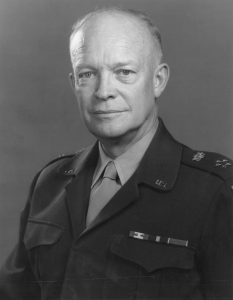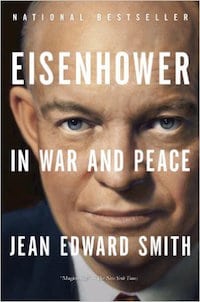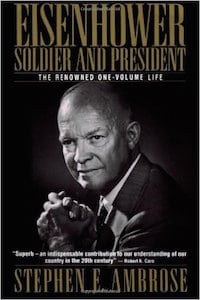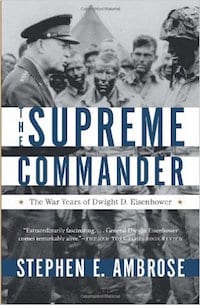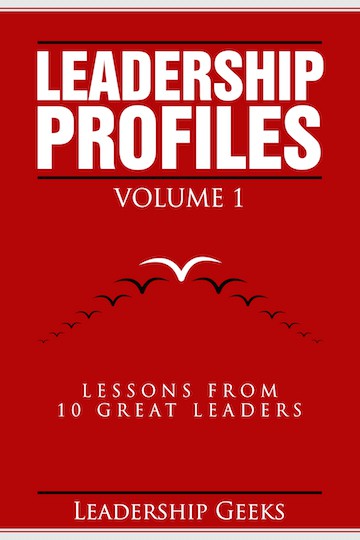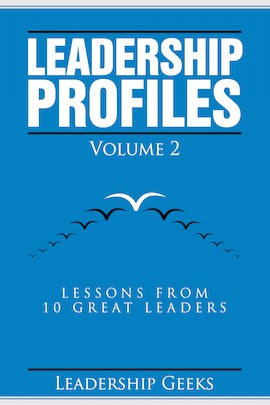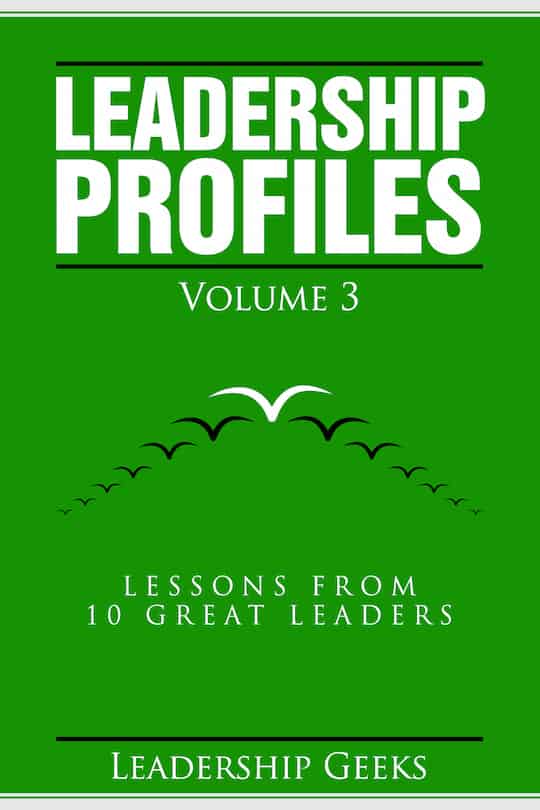Dwight D. Eisenhower was the World War II Allied Forces Supreme Commander in Europe who commanded the Allied Forces in the invasion against the Nazis. It was his superb leadership, planning and commanding ability that contributed to Allied success in World War II. He was also the 34th President of the United States, serving two terms of office from 1953 to 1961.
A Short Biography
Dwight D Eisenhower was born in Texas on October 14th, 1890. He was the third of seven sons in the family.
At the age of 20, he applied to the Naval Academy but was rejected for being over the acceptable age of entry. Instead, he went to the military academy at West Point, and graduated in 1915.
During World War I, he served as the number three leader of the new tank corps. He was promoted to Major after the war and was posted to Maryland where he remained until 1922.
When America started to take action against the Axis Forces during World War II, Eisenhower was assigned to design war plans against Japan and Germany. He was promoted to senior command very quickly because of his outstanding administrative and organizational ability.
On December 20th, 1944, Eisenhower was promoted to General of the Army. He exhibited outstanding leadership abilities during this appointment, winning the respect of the men serving under him as well as the admiration of his ally, Winston Churchill.
After the war, he took on the office of President of the United States from 1953 to 1961. During his two terms, his many notable achievements include championing the development of the Interstate Highway System, the Eisenhower Doctrine, and ending the Korean War.
In September of 1955, Eisenhower experienced his first health scare, suffering a heart attack that required several weeks of hospitalization. Eisenhower died of congestive heart failure on March 28th, 1969 in Washington D.C.
He is considered by many contemporary Western scholars to be one of the greatest U.S. Presidents.
Awards and Honours
Here are some of the awards that Eisenhower has won:
- National Defense Service Medal
- Army of Occupation Medal
- World War II Victory Medal
- Argentine Order of the Liberator San Martin, Great Cross
- French Legion of Honor
- Civitan International’s World Citizenship Award
And over 50 other awards…
Leadership Lessons from Dwight Eisenhower
1. Planning is part of success
As a military leader, Eisenhower never underestimated the importance of planning and preparation. His experience taught him that war is chaotic and unpredictable, and that the way to victory was to be prepared for as many eventualities as possible.
If you want to succeed in what you do, planning is crucial. Plan schedules, deadlines and contingencies so that you will always be focused and purposeful in your execution. Your team will be more willing to trust and respect you if you have a well-thought out plan.
2. Lead by persuasion
Eisenhower won the respect of his subordinates and allies because of the diplomatic nature of his leadership. He led by persuasion instead of using his position to force people to do things out of fear.
Using persuasion can be a very effective style of leadership. People follow and help you because they want to, not because they have to.
Ask yourself what the other person can get by helping you achieve your goal, and help them realize this conclusion. Your team will achieve common goals thanks to their passion and sense of responsibility, and you will reap far better results.
3. Don’t let anger cloud your judgement
Eisenhower famously said, “Anger cannot win. It cannot even think clearly.” It was his mother that changed the way he looked at anger, after an outburst he had as a ten-year old child. His mother told him that hating or being angry at someone only hurt one’s self; that often the other person didn’t care or even know about the anger. After reflecting on this, Eisenhower resolved to rid himself of this useless vice, and save his energy for thinking clearly.
If your decisions are clouded with anger or negative thoughts, it might help to try one of Eisenhower’s anger management techniques, such as ‘the drawer’: “I used to follow a practice–somewhat contrived, I admit–to write the man’s name on a piece of paper, drop it into the lowest drawer of my desk, and say to myself: ‘That finishes the incident, and so far as I’m concerned, that fellow.’” Books about Dwight Eisenhower
Books about Dwight Eisenhower
Read about the man who forged the path to Allied victory in World War II. This comprehensive biography of Dwight Eisenhower reveals the determination, skillfulness, and dedicated leadership necessary in dire times.
Eisenhower: Soldier and President (The Renowned One-Volume Life)
The soldier who became president, Dwight Eisenhower led the nation through one of its greatest struggles and did so with impeccable leadership. Stephen E. Ambrose brings us a detailed, extensive and well-researched account of life of the 34th President of America.
The Supreme Commander: The War Years of Dwight D. Eisenhower
It is in the times of utter adversity that true heroes and leaders shine through, and Dwight Eisenhower commanded the Allied troops through one of the greatest hardships the world has ever seen. Witness the drama of World War II as experienced by one of the greatest generals in history.
Quotes from Dwight Eisenhower
A people that values its privileges above its principles soon loses both.
An intellectual is a man who takes more words than necessary to tell more than he knows.
Farming looks mighty easy when your plow is a pencil and you’re a thousand miles from the corn field.
History does not long entrust the care of freedom to the weak or the timid.
Humility must always be the portion of any man who receives acclaim earned in the blood of his followers and the sacrifices of his friends.
I hate war as only a soldier who has lived it can, only as one who has seen its brutality, its futility, its stupidity.
I have one yardstick by which I test every major problem – and that yardstick is: Is it good for America?
I would rather try to persuade a man to go along, because once I have persuaded him, he will stick. If I scare him, he will stay just as long as he is scared, and then he is gone.
If a problem cannot be solved, enlarge it.
In preparing for battle I have always found that plans are useless, but planning is indispensable.
Leadership is the art of getting someone else to do something you want done because he wants to do it.
Motivation is the art of getting people to do what you want them to do because they want to do it.
Only our individual faith in freedom can keep us free.
Only strength can cooperate. Weakness can only beg.
Our real problem, then, is not our strength today; it is rather the vital necessity of action today to ensure our strength tomorrow.
Peace and justice are two sides of the same coin.
Pessimism never won any battle.
Politics is a profession; a serious, complicated and, in its true sense, a noble one.
The clearest way to show what the rule of law means to us in everyday life is to recall what has happened when there is no rule of law.
The history of free men is never really written by chance but by choice; their choice!
The spirit of man is more important than mere physical strength, and the spiritual fiber of a nation than its wealth.
The supreme quality for leadership is unquestionably integrity. Without it, no real success is possible, no matter whether it is on a section gang, a football field, in an army, or in an office.
There is no victory at bargain basement prices.
We will bankrupt ourselves in the vain search for absolute security.
What counts is not necessarily the size of the dog in the fight – it’s the size of the fight in the dog.
Whatever America hopes to bring to pass in the world must first come to pass in the heart of America.
‘Worry’ is a word that I don’t allow myself to use.
You don’t lead by hitting people over the head – that’s assault, not leadership.
Dwight Eisenhower Leadership Video
This is a speech given by Dwight D Eisenhower:
Other Links
Wikipedia: A highly detailed account of Eisenhower’s life
Eisenhower.Archives.org: The Eisenhower Presidential Library
More Military Leader Profiles
For leadership profiles of other famous military leaders, including Napoleon, Genghis Khan and Winston Churchill, check out our Military Leadership Profiles section.
Also check out our Leadership Profiles book series. In each book, we study 10 influential leaders in Business, Military, Politics and Sports.

